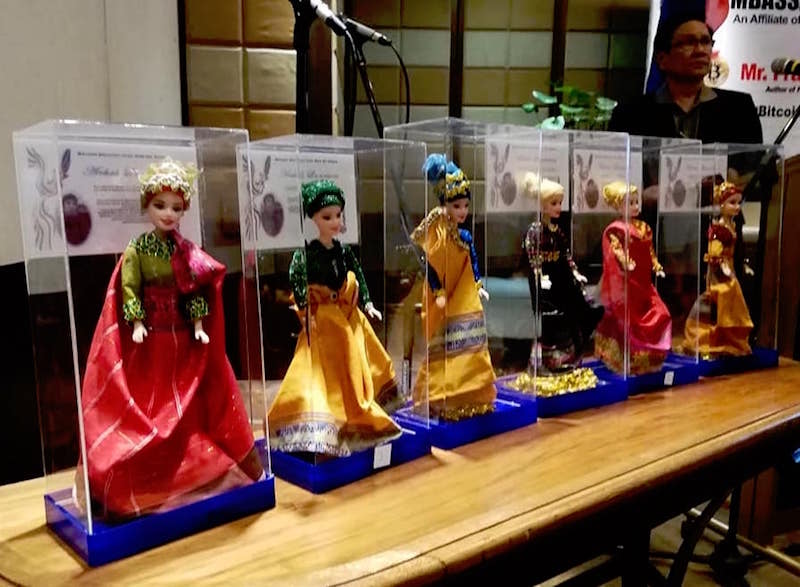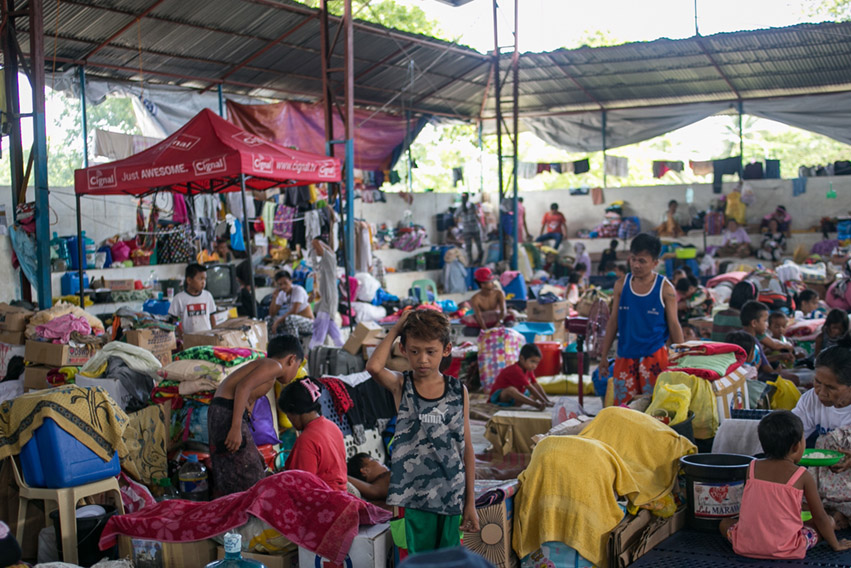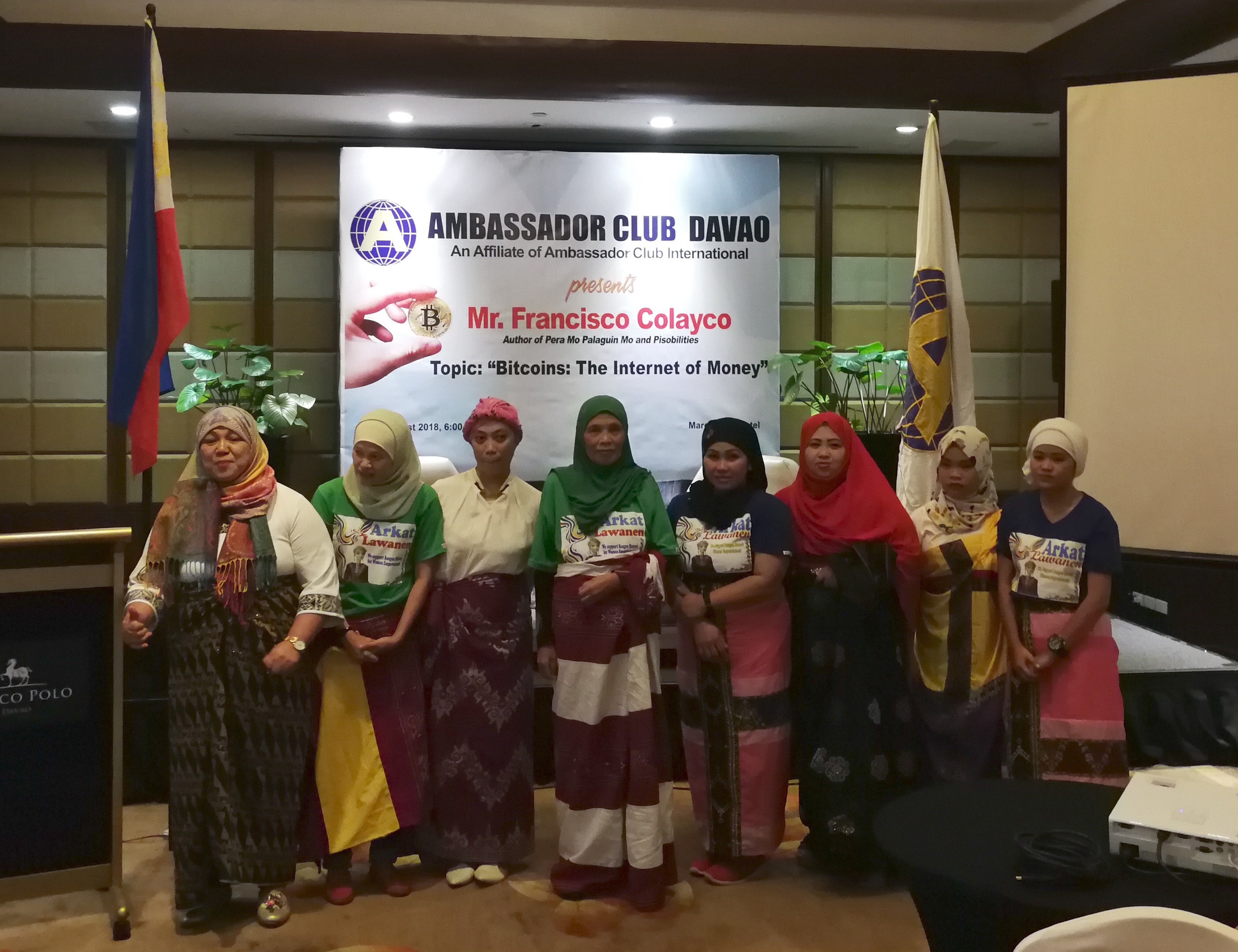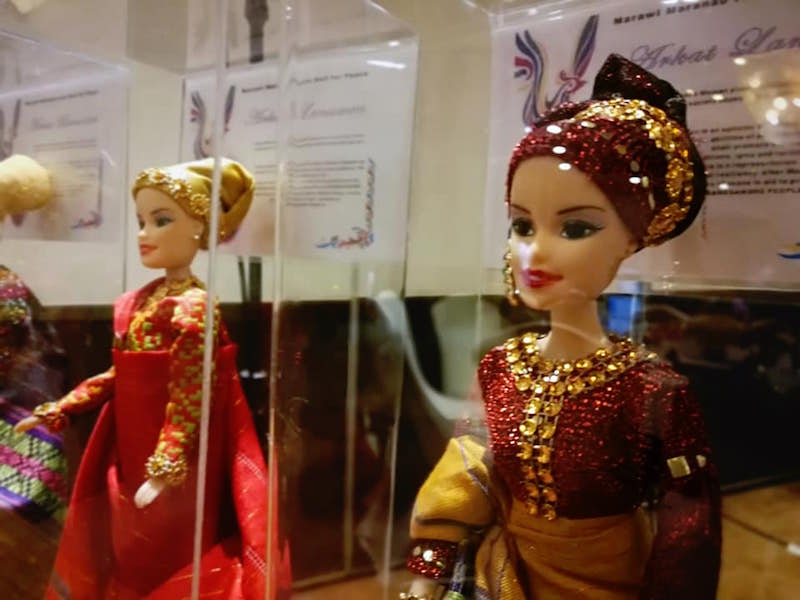DAVAO CITY (MindaNews / 12 August) — Sapiyah Macalangcom’s textile business was the go-to place in Marawi City, her clients the well-to-do families, mayors, and governors in the city and even those from the neighboring provinces.
What remained of their home and livelihood now are only memories after a five-month war between government forces and Islamic State-inspired groups reduced much of her hometown to rubble last year.
“Ang pwesto namin, kahit isang tela, walang natira (Nothing was left of our store, not even a piece of cloth),” the 57-year old Sapiyah said.
 Arkat A Lawanen Marawi Icon Dolls For Peace by the women of Marawi City. MindaNews photo by ANTONIO L. COLINA IV
Arkat A Lawanen Marawi Icon Dolls For Peace by the women of Marawi City. MindaNews photo by ANTONIO L. COLINA IV
Loving sewing while growing up, Sapiyah started a curtain shop in Marawi some 20 years ago. Later, she opened a textile business and learned to create designs herself.
Some of her works, she boasted, graced the living rooms of her customers, among them wealthy families.
“Bata pa ako marunong na ako magtahi. Ang asawa ko pumunta ng Saudi Arabia para mag-aral, ako bumangon sa pamilya ko, umasenso kami (I learned how to sew when I was young. When my husband left for Saudi Arabia to study, I raised my family and our livelihood prospered),” she said, taking out photos from her bag showing the intricate works she had done for her clients.
Her husband, Aleem Asgar, went to Saudi Arabia in 1974 to study Arabic language.
The siege
A tearful Sapiyah recounted the harrowing experience her family went through when the siege began on May 23, 2017 and ended up as the country’s longest urban warfare. Defense Secretary Delfin Lorenzana terminated combat operations on October 23, six days after President Rodrigo Duterte declared the city “liberated from the terrorist influence.”
She said life at the evacuation center was difficult, having to share space with other displaced families and surviving on relief goods from government and humanitarian groups for at least a month.
 boy stands in the middle of a crowded evacuation center for Marawi residents in Sta. Elena, Iligan City on, 8 July 2017. MindaNews photo by MANMAN DEJETO
boy stands in the middle of a crowded evacuation center for Marawi residents in Sta. Elena, Iligan City on, 8 July 2017. MindaNews photo by MANMAN DEJETO
They moved to Illigan City in late June 2017 when her husband’s condition deteriorated due to stress and depression inside the evacuation camp. But Asgar would never get to see his city again. He died after two weeks in the hospital and was buried in his brother’s hometown in Saguiaran, Lanao del Sur.
She returned to Marawi with her six children in November, when the government allowed the displaced residents to return home.
Dolls for peace, for empowerment
Her youngest son opened a small sari-sari store while Sapiyah joined a group of Meranaw women in an adopt-a-doll project initiated by the Alliance Development for Women Empowerment (ADWE).
Her skills proved to be useful. She taught younger Meranaws how to sew and make the designs for the dresses of the Arkat A Lawanen Marawi Icon Dolls For Peace launched sometime in November 2017, aimed at helping empower displaced Meranaw women like her.
Sapiyah remains hopeful the dolls would help them recover from the crisis.
ADWE chair Asliyah Limbona said they launched the project to help the recovery of the Meranaw women who are growing frustrated by the promises of so many people who go to Marawi for “picture taking” with the internally displaced persons.
As a woman’s right advocate, she felt the urge to help the women in the evacuation centers.
 Sapiyah M. Macalangcom (fourth from left) and Alliance Development for Women Empowerment (ADWE) chair Asliyah Limbona (extreme left) with Meranaw women who created the Arkat A Lawanen Marawi Icon Dolls For Peace. MindaNews photo by ANTONIO L. COLINA IV
Sapiyah M. Macalangcom (fourth from left) and Alliance Development for Women Empowerment (ADWE) chair Asliyah Limbona (extreme left) with Meranaw women who created the Arkat A Lawanen Marawi Icon Dolls For Peace. MindaNews photo by ANTONIO L. COLINA IV
For a start, Limbona gathered a group of eight women for the adopt-a-doll project to give them livelihood so that they would not depend so much on government support.
She believes it’s not enough to provide them food. Empowering the women to stand on their own would be the best way to help after the war, she said.
“We want the people to remember us that we are more than just Marawi siege, we want terrorism to be totally forgotten. We want the people to remember us through the dolls that promote our rich culture and tradition,” she explained.
She said they named the project after Arkat A Lawanen, a Muslim princess from the Darangan epic of the Meranaw people, who depicts a woman’s “important role in the transformation of the society” and a representation of “women empowerment and resiliency.”
“Those dolls will be the one to help the women recover. We shall be empowered with all the purpose in life and gain our dignity back. We cannot just wait for assistance and become a liability of the government forever,” she said.
Not just a doll
When they started, she said they thought of putting up a livelihood that would not only teach a moral lesson but would also remind the next generation of how the women helped rebuild Marawi.
She said: “Arkat A Lanawen is not just a doll but a symbol of peace, and the women as warriors of peace.”
“Marawi City was attacked and who will be these warriors? We, the Meranaw women, will be the warriors because we will be empowering ourselves. We will establish a sustainable livelihood project,” she said.
 Arkat A Lawanen Marawi Icon Dolls For Peace. Showcased at the gathering of the Ambassadors Club Davao on Friday, August 10, 2018. MindaNews photo by ANTONIO L. COLINA IV
Arkat A Lawanen Marawi Icon Dolls For Peace. Showcased at the gathering of the Ambassadors Club Davao on Friday, August 10, 2018. MindaNews photo by ANTONIO L. COLINA IV
The dolls, sold at P3,000 each, were showcased during a gathering of the Ambassadors Club Davao on Friday at the Marco Polo Hotel here, with some of the local business leaders committing to help in the market, product development, and registration with the Cooperative Development Authority to access funding support from the government.
Limbona said they have sold quite a number of those dolls already and they hope to generate more interest to help the women of Marawi. (Antonio L. Colina IV / MindaNews)
